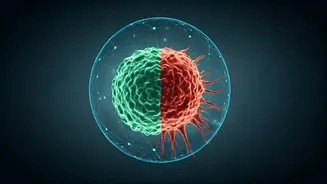AI's Cancer Crusade
Google DeepMind's newest artificial intelligence model has made significant inroads into cracking a major cancer puzzle. This achievement represents a substantial
stride in utilizing AI for biomedical research. While the specifics of the cancer mystery solved by the AI haven't been published, the announcement marks a pivotal moment, illustrating the potential of advanced computing to tackle complex challenges in healthcare. The application of artificial intelligence, particularly in areas like medical research, opens up prospects for more precise diagnoses, the identification of novel therapeutic targets, and the personalization of treatment strategies. The model's success may provide the foundation for future developments in cancer research, potentially leading to more effective interventions and improved patient outcomes.
DeepMind's Innovative Approach
The method employed by Google DeepMind's AI in tackling this cancer mystery is groundbreaking, reflecting the company's commitment to cutting-edge research. Details regarding the exact methodology the AI used remain private, but the accomplishment implies significant progress in the model's capabilities. DeepMind has already shown its potential in other fields, like protein folding, showcasing the potential of their technology in scientific research. The development underscores the broader trend of incorporating sophisticated computing into biological sciences. This paradigm shift could accelerate the rate of scientific discovery and provide insights into diseases previously considered impenetrable. It's likely that the AI model analyzed vast amounts of data and identified previously unseen patterns or correlations, leading to the breakthrough.
Impact and Future
The implications of this cancer breakthrough, courtesy of Google DeepMind, are far-reaching. The immediate effect could be accelerating the pace of cancer research and sparking new lines of inquiry. This work indicates how AI can transform our comprehension of the disease and improve future treatments. Further research and applications could see this model or similar technologies applied to the evaluation of cancer treatments, early detection, and tailored therapies. The potential for the AI model to contribute to advancements in cancer treatment is noteworthy. There could be improved understanding of the mechanics of the disease and faster advancements in diagnostics and therapy. It represents a major advancement that highlights the potential of technology to tackle some of humanity's most complex health challenges, eventually improving patient outcomes.














